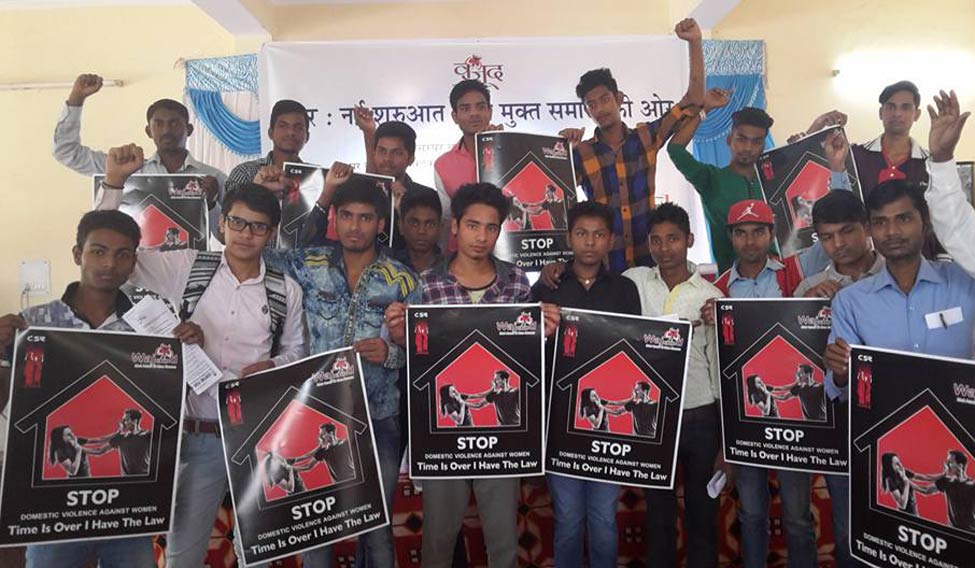When it comes to the inequality between the sexes, by and large, it's the women who face most problems. The cause is well known—patriarchy. So is the solution—legal, economic and social empowerment. The feminism discourse has come to agree that flinging mud on either side helps no one, and to fight deep-rooted issues women and men must join forces and exist together.
According to official statistics, the number of reported cases of crimes against women went up by nearly 10 per cent in 2016. There is a record of 3,37,992 reported cases in India, with an increase of 9.2 per cent in 2015 from the previous year. Nine out of ten times charge-sheets are filed, but the conviction rate is only 21 per cent. The record is a reflection of the patriarchal outlook which necessitates awareness among men and boys about the women’s issues.
In 2014, Delhi-based Centre for Social Research launched Project Wajood (a Persian word meaning existence) in collaboration with Population Services International to address domestic violence in Delhi and NCR by setting up communities of men in different areas of the city. Despite awareness campaigns and working closely with women, cases of violence continued says Juthika Banerjee, who has been leading the initiative. “It's time to address the issue from the perspective of men and boys by examining patriarchal mindsets and finding opportunities for change,” she says.
The project aims to give female victims of intimate partner violence and domestic violence an access to psycho-social and legal counselling services and support. The project focuses on reducing social tolerance towards violence through building communities by engaging men, police and medical practitioners.
“Family atmosphere is important because it shapes our value system. There was a rape case in Hyderabad where a boy aged 14 raped a three-year-old girl and the reason he gave was -- curiosity. He wanted to try out what he had seen his parents do. Perhaps, he saw his father force himself on the mother...Such things happen everywhere, not just in India, and at every level—posh neighbourhoods to slums.”
The project, currently running in Chhatarpur, Vasant Kunj, Uttam Nagar, Sangam Vihar and Usman Pur, ties up with resident welfare associations, local gyms and youth clubs where young boys and men, who can play a key role in their neighbourhoods in matters pertaining to violence, are brought together. “Like we have cadres of people who clean the city, operate the street lights etc, the idea is to create a cadre of boys and men who will take their role in intervening on violence around them seriously, as a responsibility. It would be more of dialogue where they can involve themselves, meet once a month over a cup of tea,” explains Banerjee.
How easy or difficult was it to start something like this? “Initially, they were confused about what was going on or what they had to do. Slowly, we discussed laws and crime rates in their areas with them... then they started taking an interest. We had a sensitisation programme and street plays for the boys on how they could prevent instances of eve-teasing, take action, protest...” says Banerjee.
A total of seven men’s collective and eight women’s collective meetings were organised at Uttam Nagar, Usman Pur, Vasant Kunj and Chattarpur during the last part of 2016. Apart from that, four gender sensitisation trainings were done with the police where 167 personnels and 127 paramedics at GTB Hospital in Usman Pur and Mansaram Dispensary in Uttam Nagar participated. A milestone that CSR counts for 2016 is the training of protection officers from across Delhi. Along with counselling of over a 100 cases, their teams also reached out to about 6,156 new members. A recent case of a positive impact? “In Om Vihar, a man used to beat up his wife regularly. Once our cadre was formed in the area, 3-4 men went to meet him and managed to get it stopped,” says Banerjee.
PROJECT WAJOOD
Men join hands to fight gender violence

The feminism discourse has come to agree that flinging mud on either side helps no one, and to fight deep-rooted issues women and men must join forces and exist together
This browser settings will not support to add bookmarks programmatically. Please press Ctrl+D or change settings to bookmark this page.
THE WEEK
Select your subscription
Please select subscription.
Select payment method
Please select payment method.
Confirm your subscription
Recharge E-Wallet
Enter recharge amount:
Topics :
#Women's Day 2017
| #women






